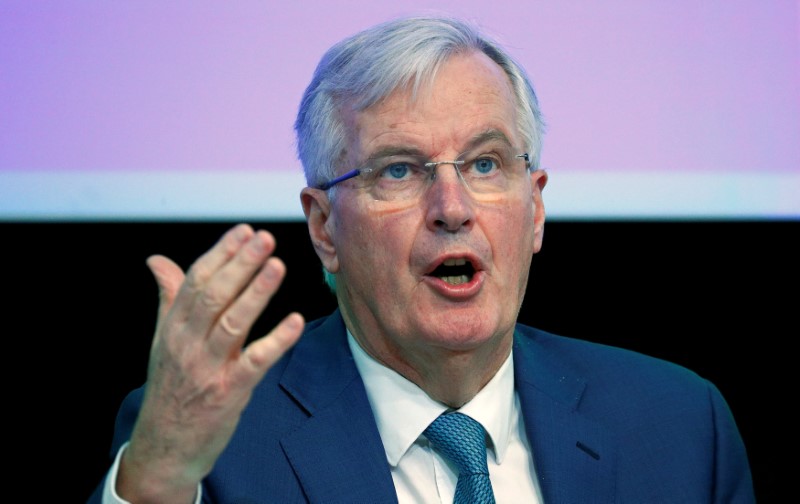By Gabriela Baczynska and Alastair Macdonald
BRUSSELS (Reuters) - EU negotiator Michel Barnier warned British lawmakers on Wednesday that their disparate efforts to amend, delay or thwart Brexit will see Britain crash out of the EU in March if they cannot rally behind one alternative.
Referring to parliament's rejection of a negotiated withdrawal treaty and raging cross-party debate about preventing a March 29 departure without a deal to cushion businesses and people, Barnier said the House of Commons faced a choice:
"There are two possible ways to leave the EU," he told a gathering of business and labour leaders in Brussels. "Number one -- an orderly withdrawal based on the agreement that we have built step-by-step with the UK over the last 18 months.
"Number two -- a disorderly withdrawal.
"Leaving the EU without a deal is the default scenario and there appears to be a majority in the House of Commons to oppose a no-deal. But opposing no-deal will not stop no-deal from happening at the end of March. To stop no-deal, another majority will have to emerge," said the former French minister, speaking in English to drive home his message to British politicians.
Referring to the need to build a majority behind an alternative to a no deal, he added: "This is the objective of the political consultations that Theresa May has started and we hope, sincerely we hope, that this process will be successful."
Prime Minister May has said she will seek amendments to the existing deal to try to overcome massive resistance even within her own party, but some of her own Conservatives in parliament are working with Labour opponents to pass legislation that seeks to force May to seek a delay in leaving rather than exit without a deal.
EXTENSION QUESTIONS
Asked by several people from the floor of the conference of the European Economic and Social Committee, including several representatives of British and Irish businesses, if the Brexit deadline of March 29 could be put back, Barnier was cautious.
He noted that a request for extension to the deadline under Article 50 of the EU treaty would have to come from the British government, which has not done so yet. It would then have to be approved unanimously by the other 27 national leaders.
"If this question is presented, they will have questions for the British government: What is it for, what is the purpose? For how long?" Barnier said.
Referring to elections to the European Parliament in late May, he also said any extension to Britain's membership of the EU should not "disrupt the democratic functioning of European institutions". Some EU officials say Britain might have to hold its own EU legislative election if it is not leaving by July.
Barnier restated his readiness to swiftly revise plans linked to the withdrawal treaty for a future trade pact with Britain if London changed its "red lines". May rules out staying in a customs union with the EU, while Labour favours that.

A customs union could ease problems with guarantees on the Irish border that anger many British lawmakers, though Barnier again stressed that, while it did not expect those guarantees to be used, the EU would not ease its support for Ireland.